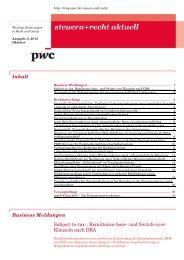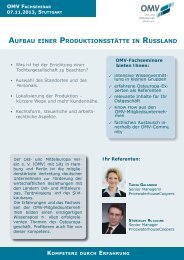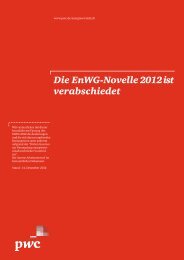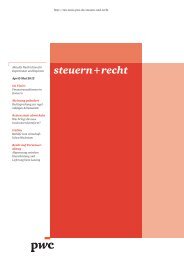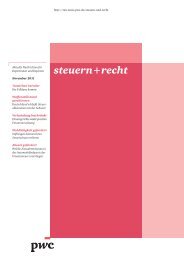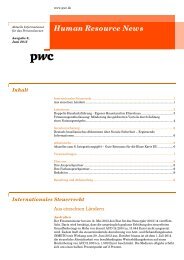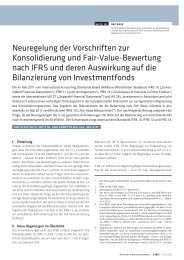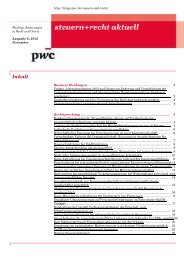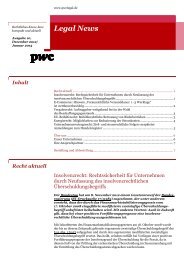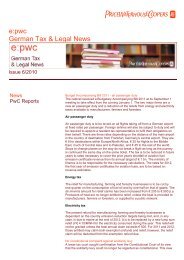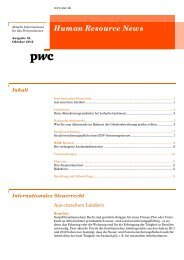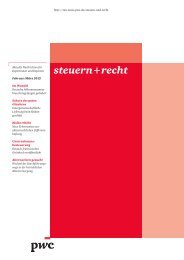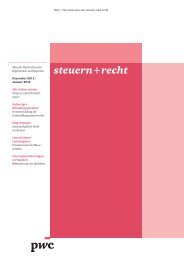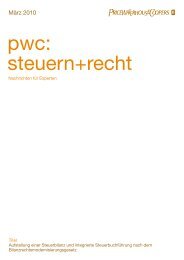Download legal-news-issue-7-2011 - PwC Blogs
Download legal-news-issue-7-2011 - PwC Blogs
Download legal-news-issue-7-2011 - PwC Blogs
You also want an ePaper? Increase the reach of your titles
YUMPU automatically turns print PDFs into web optimized ePapers that Google loves.
Tax & Legal News October 13, <strong>2011</strong> 7<br />
Supreme Tax Court judgment I R 97/10 of April 20, <strong>2011</strong> published on August 17<br />
Regular weekend trips home do not break habitual abode<br />
A Swiss resident was under contract to moderate a TV programme. She was required to<br />
start her working week in the studios on Monday morning, but was free to return home to<br />
Switzerland on Thursday or Friday for the weekend. The programme was interrupted for<br />
two months in the summer and for some two weeks at Christmas, during which time she<br />
was free of all duties. Whilst in Germany she stayed in an hotel under a semi-permanent<br />
booking arrangement; however, she did not acquire or rent living accommodation. The<br />
tax office claimed she was under full German tax liability by virtue of her German<br />
habitual abode, notwithstanding her Swiss residence under Swiss law. The Supreme Tax<br />
Court has now confirmed the tax office in this view.<br />
Under the Tax Management Act, a person has a habitual abode if he or she is physically<br />
present for longer than six months. Short-term absences do not interrupt this period;<br />
however short-term in this connection is undefined. The Supreme Tax Court has now held<br />
that it should not be defined by specific time limit, but rather by purpose of the absence<br />
away. In the present case, the moderator was in Germany to work. She regularly returned<br />
home to Switzerland for the weekend, but with the intention of coming back for the start<br />
of the next working week. These trips did not interrupt the six-month period as they did<br />
not detract from the overall appearance to a third party of a regular return to Germany for<br />
a specific purpose - to work. The Christmas break fell into the same category. Whether<br />
this also applied to the longer summer break, was no longer relevant to the decision, as<br />
the six months had already been exceeded in each year under review. The court<br />
emphasised that the six months were not tied to specific dates. Temporary absences<br />
apart, the period should be continuous, but could span a year-end.<br />
Supreme Tax Court judgment I R 26/10 (NV) of June 22, <strong>2011</strong>, published on October 12<br />
No income from stock option exercise if disposal of shares <strong>legal</strong>ly<br />
impossible<br />
An employee of a GmbH exercised his rights under a stock option plan to acquire shares<br />
in the US parent company. The stock was quoted on the New York stock exchange,<br />
although the shares in question were "restricted" under SEC rules to the extent that they<br />
could not be sold or pledged during the first year following the acquisition and could only<br />
be disposed of during the second year if the issuing company published the fact. The tax<br />
office, however, felt these restrictions on disposal to be irrelevant; the employee had<br />
acquired the other rights of ownership (dividend and voting) and had thus received<br />
taxable income in the amount of the difference between the payment made and the<br />
market price of the shares when <strong>issue</strong>d.<br />
The Supreme Tax Court has now followed previous cases in holding that the income from<br />
the exercise of a stock option is generally earned on receipt of the shares. Legal<br />
restrictions on disposal do not detract from this if their breach would merely expose the<br />
seller to a penalty. However, they are relevant where they prevent the disposal altogether.<br />
For example, if a disposal is conditional on the approval of the company, it may not be<br />
<strong>legal</strong>ly possible without that approval. This is a matter of fact, to be adduced from the law<br />
and regulations to which the issuing company is subject. If the shares are not disposable<br />
in this sense, the full rights of ownership have not been acquired through the option<br />
exercise and the option discount has not yet been earned as income. The court then went<br />
on to elaborate that if the disposal were dependent upon the company’s approval, the<br />
acquisition could be seen as complete if the approval had already been given. If, however,<br />
the approval had not yet been given, the acquisition should be seen as being in suspense;<br />
if it had already been refused, the acquisition was not, itself, a valid transfer of full<br />
ownership rights and thus not a valid flow of taxable income.<br />
Supreme Tax Court judgment VI R 37/09 of June 30, <strong>2011</strong> published on September 21,<br />
<strong>2011</strong><br />
No multiple regular workplaces with same employer<br />
Travel between home and regular place of work is only partially recognised for tax in the<br />
form of a distance-based deduction independent of the actual cost or mode of travel.<br />
Other business travel not reimbursed by the employer is deductible at cost (public<br />
transport) or at a fixed rate of 30 ct. per km driven (private car). The private car business<br />
travel rate is double the deduction for getting to work. The distinction has been explained<br />
in various ways over the years; the version currently favoured by the Supreme Tax Court<br />
is that the employee can get used to a regular journey to the same place of work. This



